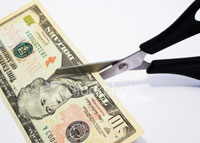US economy to go from bad to worse in nearest future
The dollar sank to a record low against the euro on speculation Federal Reserve Chairman Ben S. Bernanke will tell a congressional hearing that the U.S. housing slump threatens to slow economic growth.

The dollar fell against 15 of the 16 most-active currencies as traders bet the Fed will cut borrowing costs again after the first reduction since June 2003 on Sept. 18. The U.S. currency was also pushed lower by speculation that Saudi Arabia and some of its neighbors may abandon their pegs to the dollar following the Fed decision.
“One thing that should be clear is that this is not a dollar-friendly Fed,'' said Jim McCormick, the London-based global head of currency research at Lehman Brothers International. "The biggest focus going forward is going to be the monetary policy expectations."
The U.S. currency fell to $1.4065 against the euro, the lowest since the European single currency's inception in 1999, and traded at $1.4039 as of 7:31 a.m. in New York. It was at $1.3957 late yesterday. McCormick predicts the dollar may tumble to as low as $1.45 in the next few months. The dollar was also lower against the yen at 115.16, from 116.10 yesterday.
Saudi Arabia may drop its dollar peg, London's Daily Telegraph newspaper reported today, without citing anyone. The country failed to lower its interest rates in line with the Fed, which may pave the way for the desert kingdom and its neighbors to scrap their currency pegs as a weak dollar stokes inflation, Bloomberg reports.
Pravda.Ru has asked Andrew Jakabovics, Associate Director Economic Mobility Program, to comment on the recent interest rate cut.
“The cut in the federal fund rate is likely to help the segment of American homeowners who have adjustable rate mortgages (ARMs) that are indexed to treasuries or to the Prime rate. Americans who are most at risk of losing their homes to foreclosure, however, are those borrowers with subprime ARMs.
Three-quarters of those borrowers have loans that are indexed to the London Interbank Offered Rate (LIBOR), which is higher today than a month or a year ago, are unaffected by the Fed's actions. While there may be some loosening of the credit crunch and increased liquidity for banks and other investors holding mortgages, it is by no means clear that the rate cut will translate into new mortgage lending activity.
Without a willingness to make new loans, the backlog in unsold houses continues to grow. The overall slowdown in housing markets across the country has wider impacts for the economy as a whole, as we have seen a dramatic cutback in new residential construction (down nearly 20 percent this August versus last August) that is likely to continue for some time.
Historically, we have used the housing sector to restart economic growth during slowdowns, but the Fed rate cut is unlikely to be that catalyst. Instead, we need a focused intervention by the White House and Congress to strengthen the housing market, secondary mortgage markets, and, ultimately, the economy as a whole,” says Andrew Jakabovics.
Michiyoshi Kato, a senior trader at Mizuho Corporate Bank, echoed the view, saying the Fed's decision to lower the Fed funds rate by 50 basis points may have spurred concerns over the outlook for the world's largest economy.
"Some players are wondering if the Fed's decision suggests that the U.S. economy will go from bad to worse in the near future," Kato said. "If that is the case, it's very difficult to buy the dollar now."
The Bank of Japan, as widely expected, left interest rates unchanged in its policy board meeting ended Wednesday — a move seen as helping the American currency regain some of its early losses.
Against other regional currencies, the dollar was lower, falling to 1.5078 Singapore dollar from 1.5092 the previous day, and to 45.560 Philippine peso from 46.050. It dropped to 926.4 South Korean won from 930.7, iht.com reports.
Source:agencies
Prepared by Alexander Timoshik
Pravda.Ru
Subscribe to Pravda.Ru Telegram channel, Facebook, RSS!




